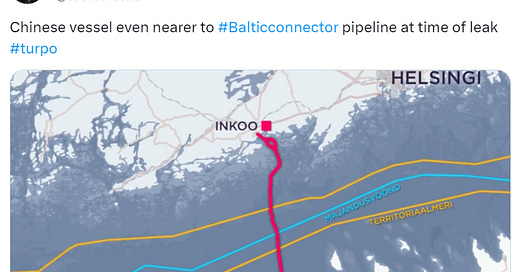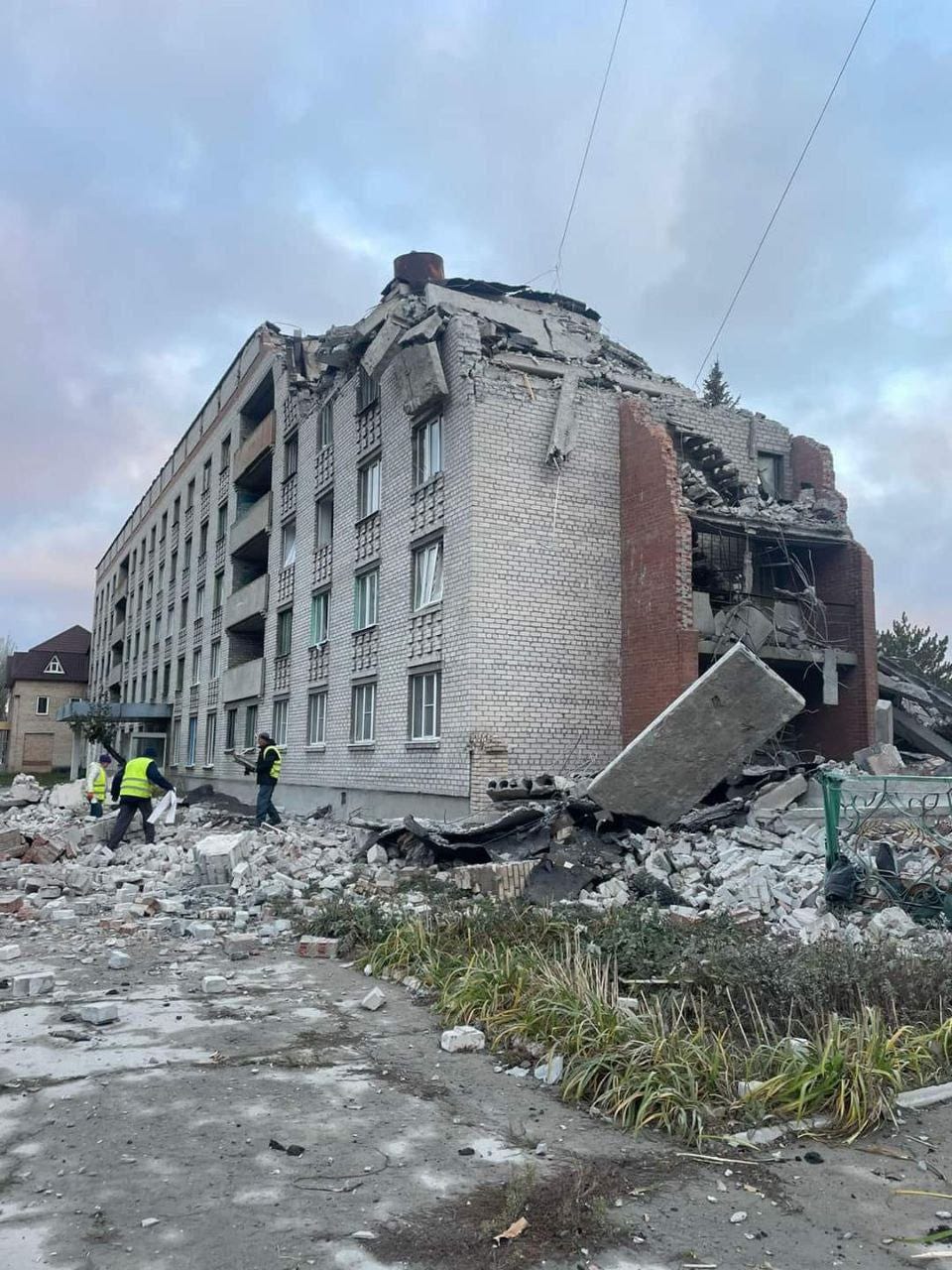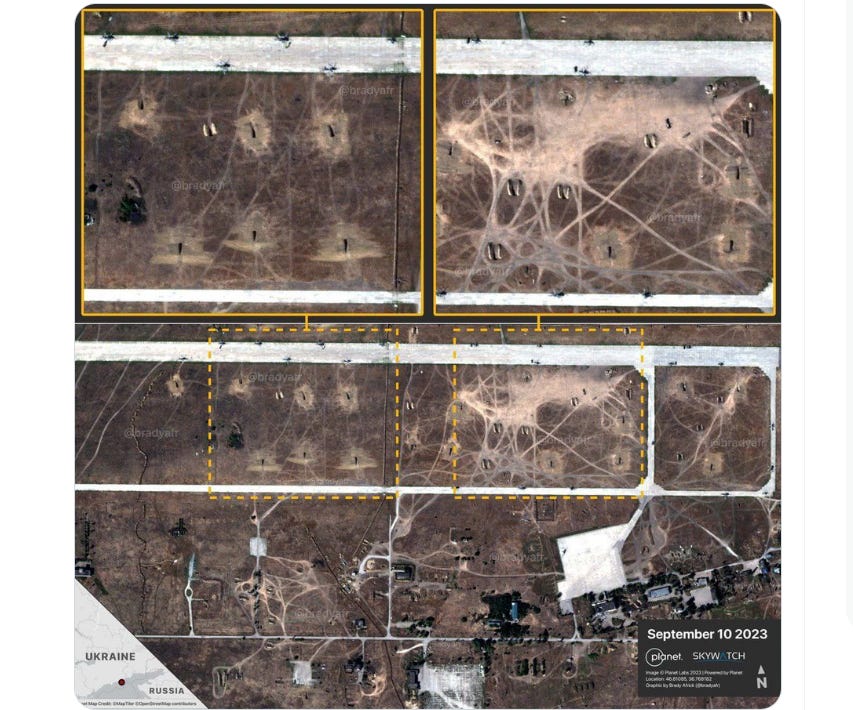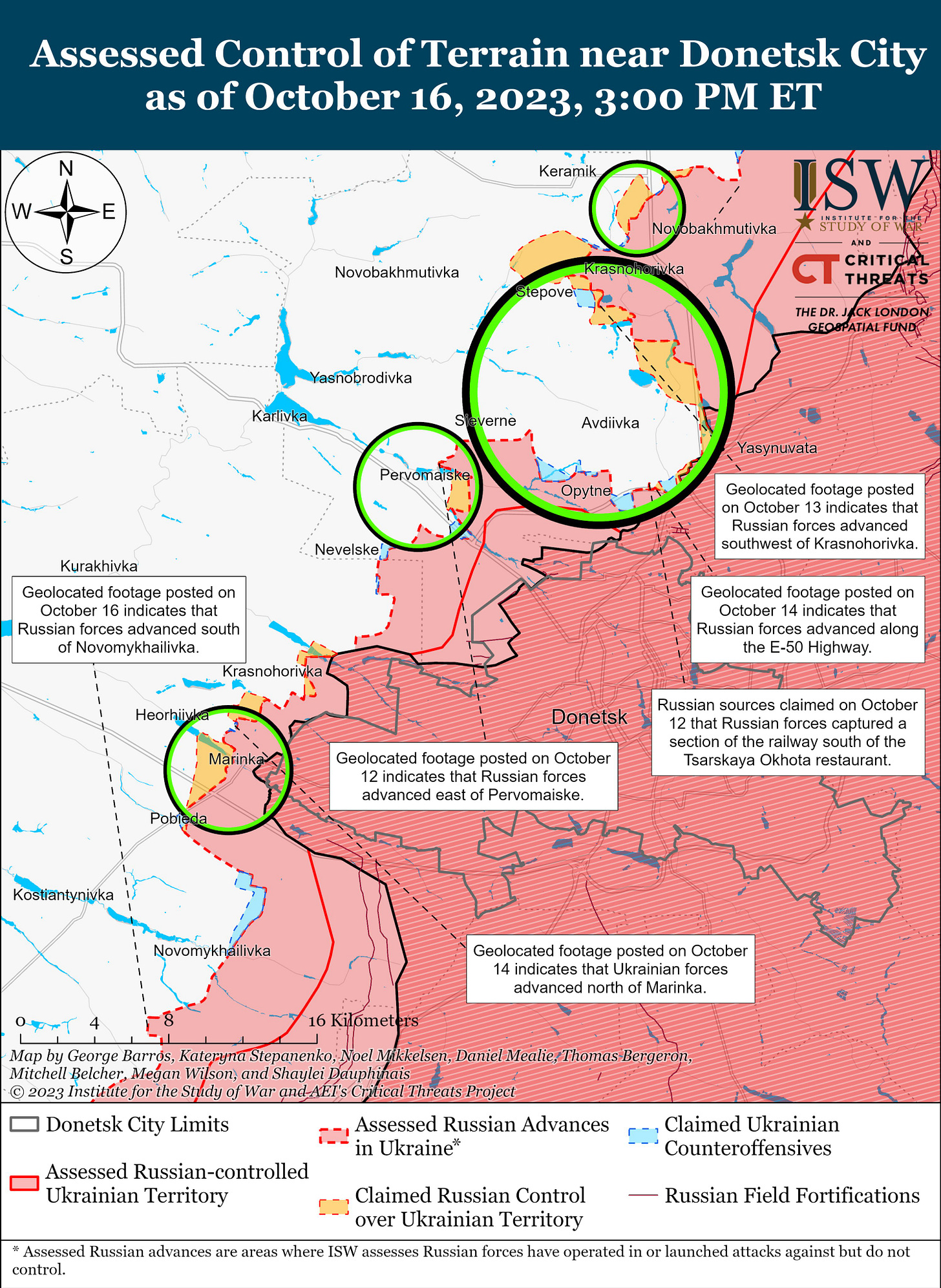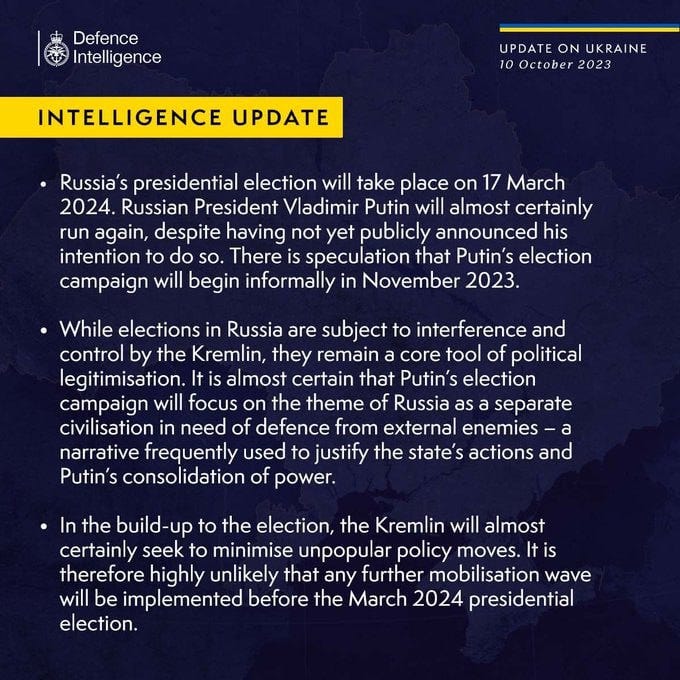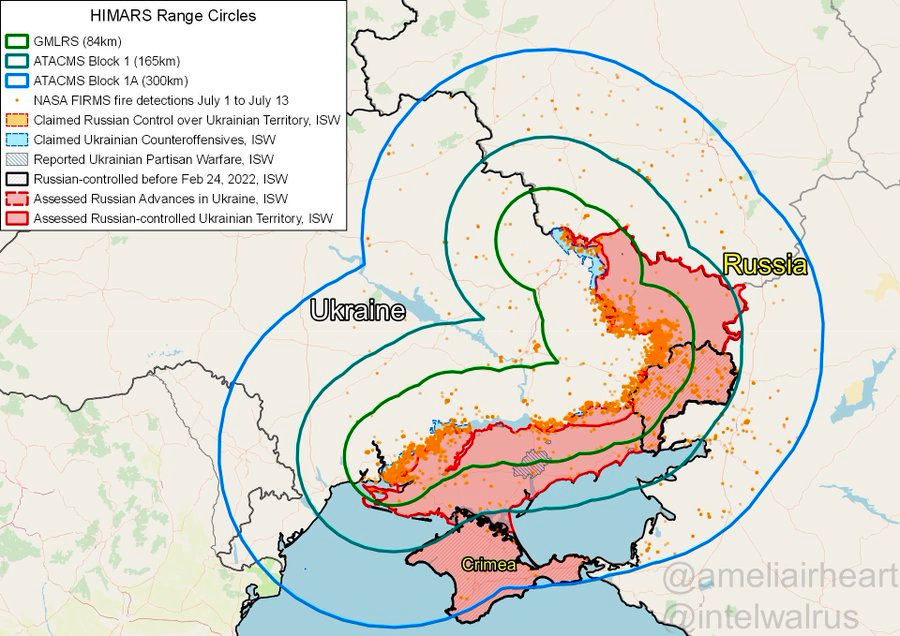Oct 19: E-Stories
Day601 Zelenskyy Kherson Izyum Luhansk Berdyansk Avdiivka EESWconnector BRI-RU-Orban SBU Qatar Serbia InRussia BehindLines Allies PolandVotes ISRAEL A&P Noel ISW UKDef Nichols
Catching up…
EA Worldview’s Ukraine Up-date- hop over to Scott’s amazing hourly Ukraine up-date page. I’ll fill in with some bits and bobs.
President Zelenskyy’s evening speech…and thanks.
Stories we’re following…
Russia dops 9 aerial bombs on Kherson Oblast's Beryslav district. Five Russian Sukhoi attack planes carried out an attack against four settlements in Kherson Oblast's Beryslav district on Oct. 16, dropping nine guided aerial bombs, Governor Oleksandr Prokudin reported.
Russian forces targeted the Izium (Kharkiv Oblast) with missiles late on Oct. 16, General Serhii Melnyk, the head of the Kharkiv military garrison, said. The missiles were launched from Russia's town of Valuyki, located in Belgorod Oblast some 15 kilometers north of the Russia–Ukraine border.
Russia hit a 5-story dormitory in Sloviansk, Donetsk region. "Rescuers are working at the scene. Rescue work continues. There are people under the rubble," the State Emergency Service adds.
Combat Situation Update
Ukrainian StratCom confirmed that overnight, Ukrainian forces successfully struck a Russian airfield, equipment, helicopters and Russian forces in both Luhansk and Berdyansk.
Russian Air Force affiliated channel Fighterbomber confirms there are losses among personnel and equipment after the attack—Operation DRAGONFLY— this morning. Calling it 'one of the most serious blows of all time". He claims this is done by ATACMS which are not confirmed supplied to Ukraine.
A total of 9 helicopters of different modifications, special equipment, air defense launchers, runways and an ammunition warehouse were either damaged or destroyed.
Based on Sentinel Hub satelite images of Berdyansk airport taken on 15-10-2023, it looks like a minimum of 20 helicopters could have been present. Assuming they haven't moved since that date.
The Russian forces have been trying to take Avdiivka for days but their offensive is starting to wane Kyiv officials said on Monday. Ukrainian forces repelled 15 Russian attacks from four directions on Avdiivka over the previous 24 hours, the Ukrainian general staff said. ISW confirms that:
“Russian forces continued offensive operations aimed at encircling Avdiivka … but have yet to make further gains amid a likely decreasing tempo of Russian operations in the area”.
Media: Oil tanker hits mine in Black Sea, sustains minor damage. The vessel Ali Najafov sustained only minor damage, and the crew was unharmed, sources told Reuters.
Behind the Lines
The Associated Press has some more information on the damaged undersea telecommunications cable between Sweden and Estonia. Cable between Sweden, Estonia damaged around same time as Balticconnector.
Estonia’s economy ministry said the disruption in the Swedish-owned cable was in Estonian territory, about 30 miles off the island of Hiiumaa in northern Estonia, the Baltic News Service said. Service was restored within a few days, the agency added.
Sweden’s defence minister, Pål Jonson, said his country’s police, military and coast guard were in contact with Estonian counterparts regarding the matter. He said there also was heightened vigilance in the Baltic Sea.
Russian convicts who signed six-month contracts with the Russian Ministry of Defence to fight in Ukraine in exchange for a pardon are dismayed to find that they are now being threatened with death or torture unless they sign new contracts for up to a year.
Qatar to return 3 Ukrainian children deported to Russia. Three Ukrainian children who were illegally deported to Russia are in the process of being released to Qatari diplomats in Russia, who will then facilitate their return to Ukraine, an unnamed Qatari official told Reuters on Oct. 16.
SBU: 57 collaborators involved in the torture of Ukrainians in Kherson Oblast identified. An investigation revealed the identities of 57 Ukrainians who collaborated with Russian forces to detain and torture local civilians in Kherson Oblast, Ukraine's Security Service (SBU) reported on Oct. 16.
Russian theologian, known church critic Andrei Kuraev leaves Russia for Czechia. Andrei Kuraev wrote on his Telegram channel that his "Moscow world was destroyed" as it is becoming increasingly difficult to "write, speak, and lecture" in Russia, while in Europe, his public events and lectures are still possible.
Slovakia's pro-Russian SMER party to lead foreign affairs, defense in new government. Leaders of the left-populist SMER, social-democratic HLAS, and the ultranationalist Slovak National Party have agreed on how to divide ministerial seats in the new government, Aktuality reported on Oct. 16. Slovakia’s populist former prime minister, Robert Fico, and his party signed a coalition deal to form a new government expected to reduce support to Ukraine, Reuters reported.
Mykhailo Fedorov: Conversation with data. Jointly with Palantir Tech we create a virtual assistant for the Government. Revolutionary tool powered by AI will help to find out the number of destroyed schools, minefields, suggest rebuilding plans.
Meanwhile in Russia
Russia admits most of its drones come from China. "Today, (our) drones are mostly all from the People's Republic of China," Finance Minister Anton Siluanov said at the meeting of the State Duma's Budget and Taxes Committee.
Putin has arrived in China for the ‘Belt and Road Initiative’ conference, where he won't be arrested for war crimes, and handed over the the International Criminal Court for trial on charges. A reminder that he is wanted for the organized mass abduction of Ukrainian children - which could be judged an act of genocide.
Russia is revoking ratification of the comprehensive nuclear test ban treaty because the irresponsible attitude of the US to global security, Vyacheslav Volodin, the speaker of the lower house of the Russian parliament said on Tuesday. The Russian parliament will debate revoking the ratification later on Tuesday, Reuters reports.
A reminder: Russian foreign minister to visit North Korea this week. Russian Foreign Minister Sergei Lavrov will pay an official visit to North Korea amid Western concerns about extended military cooperation between Moscow and Pyongyang. A reminder that North Korea has been supplying the Russian forces for its war in Ukraine:
Two Russian ships linked to the military began transporting containers - apparently containing weapons - from North Korea to the Primorsky Territory in mid-August. Around the same time, at an arms depot in the Krasnodar Territory, they began expanding pits for storing ammunition. North Korean containers began arriving there by rail at the end of September.
This is evidenced by an analysis of satellite images conducted by experts from the British Royal United Defense Studies Institute (RUSI), which they shared with The Washington Post. American officials confirmed to the newspaper that they consider the warehouse in Krasnodar Tikhoretsk to be the destination for North Korean cargo.
Orban in China: Orbán attends the Belt and Road forum in Beijing, "unofficially boycotted by the rest of the EU". Putin emphasized that he aims to maintain and develop relations with Hungary while taking into account each other's interest. Orban said that he is is also interested in maintaining relations, also economically, as far as possible. He expressed gratitude to Rosatom and Gazpom for remaining a partner and fulfilling their obligations.
Russian authorities decide not to raise taxes: Despite recent warnings from Central Bank head Elvira Nabiullina that Russia needs to raise taxes if it’s not cutting govt expenditures, Finance Minister Anton Siluanov claimed on Monday that there will be no tax hikes until 2027.
The jailed Russian politician Alexei Navalny condemned the arrest of three of his lawyers as he stood trial in the prison where he was being held, Russian media at the hearing said on Tuesday. Lawyers Vadim Kobzev, Igor Sergunin and Alexei Lipster – who have defended Navalny – were detained last week, Agence France-Presse reports.
Chinese fighter jets came within 5 meters of a Canadian plane in aggressive, abnormal, and unusual intercept. "They became very aggressive and to a degree we would deem it unsafe and unprofessional," Maj. Gen. Iain Huddleston said. A reminder that Russian jets have been doing this for years. It may look like an act of intimidation, but there are others reasons for it as well.
India does not want to pay in yuan for Russian oil. The Indian authorities do not like the fact that state-owned oil refining companies have begun paying for Russian oil in yuan. Because of the authorities' stance, at least seven cargoes delivered by tankers in recent weeks remain unpaid, people familiar with the situation told Reuters.
Indian buyers pay for Russian oil the old fashioned way - in dollars, as well as in UAE dirhams (which now account for the bulk of turnover) and rupees. But there were problems with payment in national currency. Billions of dollars worth of rupees have accumulated in Indian bank accounts: Russia cannot withdraw them, since capital account restrictions apply, and Indian exports to Russia are too small to pay for them with the accumulated amounts.
Allied Support
The European Parliament approved the creation of a €50 billion fund for Ukraine until 2027 for the country's recovery and reconstruction. 512 deputies voted for, 45 against and 63 abstained. The EP also called to use Russian assets to rebuild Ukraine.
The US will allocate almost $700 million for the modernization of Ukrainian ports, railways and checkpoints, said Deputy Prime Minister for Reconstruction, Development and Infrastructure of Ukraine Oleksandr Kubrakov after a meeting with US Special Representative Penny Pritzker.
Follow-up: Zelensky, Pritzker meet in Kyiv, discuss recovery of Ukraine's energy system. "Your visit is a signal of strong support. It is important for us to see that the United States is ready to help Ukraine get through the winter period and protect critical infrastructure facilities," Zelensky told U.S. Special Representative for Economic Recovery in Ukraine Penny Pritzker at the meeting.
The range for missiles now being supplied to the Ukrainian Forces by its allies.
The Lithuanian Armed Forces, jointly with the German defence industry, will repair Leopard tanks brought back from combat operations in Ukraine. After restoration, they will be returned to the front.
A convoy of British ambulances has arrived in Lviv in western Ukraine and will be delivered to hospitals on the frontline. Five vehicles donated by the charity Medical Life Lines Ukraine are being sent to the southern city of Kherson – which is under intense Russian attack – as well as the towns of Kupiansk and Vorozhba in the war-torn north-east of the country. Since last year’s full-scale invasion the group has donated 43 vehicles. More than £400,000 has been raised.
The Czech Republic will get rid of its dependence on oil from Russia. "We are creating real energy sovereignty. In a matter of months, we will get rid of our dependence on Russian oil. Nuclear fuel is expected to follow," said the Czech Prime Minister.
Poland's Third Way bloc rules out coalition talks with Law and Justice party. With most of the votes counted, conservative-populist PiS is expected to win the highest number of votes after the Oct. 15 elections but not enough to form a new government on its own.
Brussels attack: suspect shot dead by police after killing of Swedish football fans. The man suspected of killing two Swedish football fans and wounding another in a terrorist attack in Brussels on Monday night has died after being shot by police. The suspect, a 45-year-old Tunisian calling himself Abdesalem Al Guilani, claimed in a video on social media that he was a fighter for Allah. The Belgian prime minister, Alexander De Croo, called it a brutal terrorist attack, while the French president, Emmanuel Macron, said Europe had been victim to another Islamist attack.
Speaker vote in the House:
Around the World
A session of the Israeli Parliament, which is in Jerusalem, was suspended and the deputies took refuge , according to images broadcast on Israeli television.
The armed wing of Hamas claimed to have fired a “barrage of missiles” on Jerusalem and Tel Aviv. The Al Qassam Brigades stated in a statement that their attack came in response to “attacks against civilians” by Israel.
Al-Qaeda Central released a statement calling on Muslims worldwide to rally behind Hamas and join their “once or twice in a lifetime” jihad to liberate Palestinian land. They advocated that Muslims interact negatively and boycott everything Western and Jewish. Al-Qaeda called on them to provide material and moral support. This includes supplying men, money, food, and weapons. They also asked jihadists to attack Western and Jewish assets. The statement specifies military, security, and economic institutions. Al-Qaeda extends its call to target Christians, claiming they torment Muslims and suggest that Muslims take action to kill, capture, and torture them.
On October 15, Joshua Zarka, the Israeli Foreign Ministry’s head of strategic affairs, accused Iran of deploying weapons in Syria, attempting to open a second war front against Israel. Zarka stated Israel intends to prevent this development. Iran previously warned Israel against starting a ground offensive in the Gaza Strip. They claimed this would risk a spillover of the conflict but said they were prepared for this development.
Significance: Despite its threatening rhetoric, it is unlikely that Iran will directly participate in the conflict. Instead, Iran will very likely strengthen its support for militant groups in the region. Iran-backed militant groups will likely increase their efforts to aid Hamas by building militant camps near the border and launching rockets toward Israel. They likely aim to enlarge the northern Hezbollah-opened front, forcing Israel to spread its attention over a larger area, weakening its overall responses. Israel will likely react by continuing to launch airstrikes on Syria, risking a spillover of the conflict to Syria.
Reuters reports that a deputy commander of Iran’s elite Revolutionary Guards, Ali Fadavi, has said on Iranian state media that “The resistance front’s shocks against the Zionist regime will continue until this ‘cancerous tumour’ is eradicated from the world map. Another shockwave is on the way, if Israel does not end atrocities in Gaza.”
Israel has asked the United States for $10 billion in emergency aid. Three officials said lawmakers are working on a package that would also include funds for Ukraine, Taiwan and improved law enforcement efforts along the US-Mexico border.
Israel has blocked more than 100 accounts on the Binance crypto exchange in the fight against Hamas funding. The volume of cryptocurrency funds flowing into accounts linked to Hamas and other groups "sharply increased" after the attack, according to Tom Aleksandrovich, executive director of Israel's National Cyber Authority. Since October 7, about 150 campaigns have been identified to collect donations for them, sources told the FT. Aleksandrovich called cryptocurrencies “the main way to finance terrorism at this stage of the war, because there are no other options.”
Media: Israel refuses Zelensky’s visit, says 'time not right.' The president was, however, told that the visit might be possible at a later date, the news outlet said. Zelensky reportedly wanted to make the trip alongside U.S. State Secretary Antony Blinken, who arrived on Oct. 16 to assure Tel Aviv of Washington's support in the ongoing Israel-Hamas War.
Results Polish Election
The final outcome of Poland’s Sunday election have been published:
Law and Justice (PiS): 35.38%
Civic Coalition (KO): 30.7%
Third Way: 14.4%
The Left (Lewica): 8.61%
Konfederacja: 7.16%
Poland’s election is a big win for the centre-right European People’s party. Civic Platform is a member of the EPP, and Donald Tusk was president of the EPP from 2019 until 2022. Polish member of the European parliament Róża Thun said the message to European partners is that Poland is “back.”:
We need a strong Europe and we want to have a voice in the world - not only in the European Union. So the first thing that our European partners hear today is, we are back. And that’s an extremely important message for us in Poland as well, but also for Europe. We are back. We will not show the back to the European Union anymore. We want to cooperate, we want to reinforce this Europe. And this message is extremely strong, because the victory of democratic forces is very clear.
But the parliamentarian also said that there are “huge challenges in front of us.”
First thing is of course, rule of law, independence of judiciary, back to Europe, as we call it, that we need to give, again, freedom or render those institutions free from party control and influence, and that’s not only judiciary, but also military, police, public media.
The leader of Poland’s liberal Civic Coalition, Donald Tusk, has called on the president to make a quick decision on appointing a government.
“I am making a passionate appeal to the president, people are waiting for the first decisions, so we are asking the president for energetic and quick decisions,” Donald Tusk.
Tom Nichols: Lest Darkness Fall
Democracies overseas are under siege, and some Americans think the United States should stay out of those struggles. But supporting our friends and allies against barbarism is both in our national interest and part of our identity as a people.
Last week, I mentioned the field of counterfactual history, the intriguing what-ifs about how great events could have turned out differently. One of the most celebrated of all such stories is a 1941 novel by the prominent science-fiction writer L. Sprague de Camp titled Lest Darkness Fall, in which a 20th-century archeologist named Martin Padway finds himself suddenly transported to sixth-century Rome. Padway knows he has arrived just before the final Gothic War, after which Europe would descend into the Dark Ages, and he uses his knowledge of history and technology to fend off Rome’s collapse. In the end, he secures a better future for Europe and perhaps the world: “Darkness,” the book concludes, “would not fall.”
Padway succeeds because he has the gift of hindsight. He knows with complete certainty what will happen, when, and why, and so he can intervene at key moments to avert disaster. In real life, the rest of us have to plod along in sequential time, doing our best with what we know at the moment.
But sometimes, history shows us the darkness in the distance. We are living through such a moment now. The conflicts in Ukraine and Israel are warnings of the darkness to come.
For many Americans, wars in faraway places seem to be only dangerous snares that might lead us into the jungles of Vietnam, the mountains of Afghanistan, or the sands of Iraq. Involvement seems pointless. Advocates of a more isolationist foreign policy quote what they see as a prescient warning from John Quincy Adams to stay out of the global fray: America, Adams said as secretary of state in an 1821 address to the House, “goes not abroad, in search of monsters to destroy. She is the well-wisher to the freedom and independence of all. She is the champion and vindicator only of her own.”
Wise words in 1821. Today, however, free nations cannot hope to keep their liberties safe in a hothouse while authoritarian tornadoes bear down on them. America and its allies might not want to go abroad looking for monsters, but sooner or later, the monsters will be looking for us. We all have every incentive, in the most personal and concrete way, to prevent such regimes from roaming the Earth at will.
Step back for a moment from the specific nations at war in Europe and the Middle East right now, and think about what kinds of conflicts we’re seeing.
In Europe, a giant, paranoid, nuclear-armed dictatorship has embarked on a war of conquest and genocide against its democratic neighbor. The aggressor, abandoning all pretenses, has simply declared that another nation should not exist and its people must accept their new masters or die.
In the Middle East, a militarized terrorist organization is undertaking a campaign of slaughter, with the intentional aim of inflicting gruesome torture and murder on as many people as possible.
Two wars: one of conquest, one of terror, both aimed at national extermination. As the Atlantic contributor and Johns Hopkins professor Eliot Cohen has put it, these conflicts pit civilization against barbarians. If the barbarians win, they will inflict more devastation, expand their goals, and encourage other regimes to engage in similar barbarism. Over time, they will join hands and ally against us. They will have one another’s backs not because of any tripe about “honor among thieves” or Milton’s “firm concord” among devils damned but because they are not fools: They know that their survival depends on supporting one another in their crimes.
If these barbarians succeed, they could one day affect the lives of Americans in ways most citizens cannot imagine. They could control the passage of goods across the skies and seas; they could hold hostage U.S. citizens who dare to travel abroad; they could imperil American lives by denying access to any number of resources. And if we squawk about any of it, the nuclear-armed powers among them can threaten to immolate an American city as the price of resistance.
The safety and the security of the United States is the easiest case to make for maintaining our commitment to help Ukraine and Israel. But we should not fall back on such narrow definitions of utility and interest. If we are not willing to offer our help and support to Ukraine and Israel at this moment, what does it even mean to be an “American”?
Blood-and-soil nationalists would dearly love to have Americans think of themselves as people attached to only borders and dirt (and, for some, particular strands of DNA) rather than an idea. But “American” is not an ethnic identity. It is a choice, a bond to the Constitution and its ideals. America is not a defense compact or a customs union. It is a statement: Human beings have rights that can never be taken away, and our nation values and defends those rights.
For Americans to say that they will protect such rights only for ourselves is to betray a fundamental part of our identity as a nation and as a people. But what can the average citizen do? Stay engaged. Just a third of Americans can find Ukraine on a map; be an informed voice among your fellow citizens. Stay in touch with your elected representatives. Do not let the most irresponsible voices be the only voices. Members of Congress—and I speak from experience as a former staffer—do in fact pay attention to messages from their district.
And remember that voting matters. Poland on Sunday turned back an authoritarian challenge with an approximately 73 percent voter turnout. Meanwhile, the state of Louisiana just elected the far-right-wing lawyer Jeff Landry as governor with a turnout of about 35 percent, meaning that Landry will walk into office as the choice of 18 percent of Lousiania’s eligible voters.
We live in an exceedingly dangerous time. And yet we continue our childish bickering. We wring our hands over false choices. And, perhaps worst of all, some Americans seem interested only in how these crises can help in their grotesque and sometimes inane efforts to score political points. Darkness threatens to fall. But it can still be stopped, if Americans can summon the maturity and the will to embrace their responsibility as the leaders of the free world.

